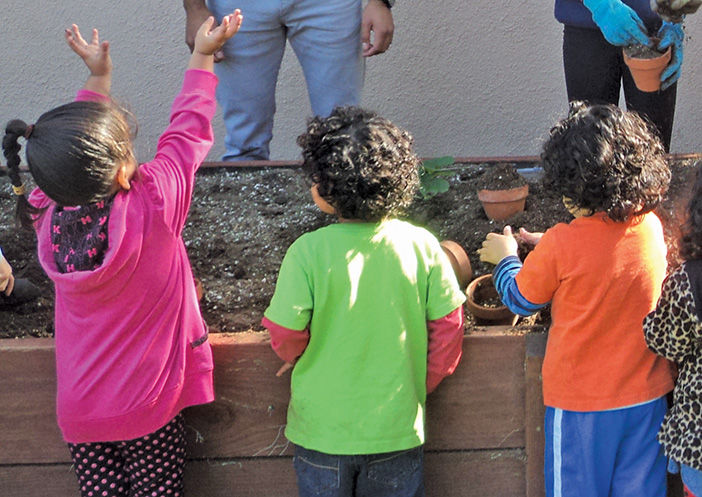The Sisters of the Good Shepherd were originally founded in 1641 in France to help prostituted women and are now serving in 72 countries.
“Almost all of our work — worldwide — is with women and children, most of whom have been abused or exploited in some way — trafficking victims, runaways, domestic violence. One in three women worldwide will be abused at some point in her lifetime,” said Sister Anne Kelley, executive director of the Good Shepherd Shelter in Los Angeles, adding that close to 98% of prostituted women were sexually abused as children.
The sisters have been serving in Los Angeles for 111 years. Initially they cared for abused children and runaways but changed their program in 1977 to serve mothers and children who were victims of domestic violence. The Sisters saw from the beginning that the way to stem the violence was to change the home. Good Shepherd Shelter was one of the first of three in the whole country for victims of domestic violence.
“These guys are very charming,” Sister Anne explains of the batterers. “That’s how they get the girl in the first place. Then they get possessive. It’s not about anger. It’s about control.”
“In the cycle of domestic violence we have what we call the tension-building phase. Then the battering phase. Then the honeymoon phase where they say, ‘I love you so much! I’m so sorry, I’ll never do it again.’”
Often, women will leave a domestic violence situation seven times before they leave permanently.
“There are a thousand reasons for that. Most of them are survival reasons. He’ll threaten her, her children, her parents, her pets. Seventy-five percent of the women who are killed are killed after they’ve left or are in the process of leaving.
“So it’s really, really dangerous. The women are really, really brave. And we’re under the radar by design.”
Typically a woman will come to Good Shepherd from a domestic violence emergency shelter.
“We’re looking for families where the woman is ‘done.’ What makes her done is when she realizes the children are being abused, physically and/or sexually. ‘I don’t care what you do to me, but you’re not touching the kids.’ They will literally die for their children, and some of them do, but they’ll also live for their children. So they’ll set the pattern for their children’s future.”
All the women at Good Shepherd bring kids with them. The shelter has a school on site. They handle everything: housing, education, therapy, legal.
How do the sisters protect themselves and their flock?
“Do you want to meet my Rottweilers? We have a fully integrated security system. We have gates all around. We’re on very close terms with the local police.”
In the garden, Sister Renée is showing a mother and her two kids how to plant sunflower seeds. The planting of a seed, in the midst of such darkness and trauma, seems tantamount to an act of resistance. Shelter inhabitants also grow Tuscan kale, Swiss chard, strawberries and herbs.
The extensive grounds are dotted with tall, old-growth trees: jacaranda, deodar, Aleppo pine.
“Those little trees over there used to be big trees,” Sister Anne points out. “We had a couple of boys who were incredibly violent. They broke all the lower branches. So we had a little pro-life talk. We took up a collection and they paid for new trees and we dug the holes and we had a blessing of the trees to show them ‘This is a living thing, just like you.’”
Kids, mothers and staff together do yoga right in the yard, next to the flowers and trees. Other coping skills taught by the sisters include deep breathing, trauma journals and meditation.
“That’s how you break the generational cycle. You give these kids the tools and teach them that they have the personal power.”
The mother is key. The sisters’ goal is to help her grow as person, parent, provider, in that order. Their feeling becomes, “I got these beautiful children. God brought something good out of this traumatic experience. When they leave here, they’re incredibly strong and they’re proud of what they’ve done.”
Of their families, 96 percent go on to live violence-free lives. Most of their kids go on to college.
“I believe the Good Shepherd model represents the best chance for the City of Los Angeles to combat and eliminate domestic violence,” says director of development Kathleen Buczko.
“If we can work to tell this story of the sisters and how they rebuild families, we can change the face of the whole nation, if not the world.”
What’s kept Sister Anne going for 31 years?
“Watching the miracles every day. Seeing a woman for the first time discovering her grace and dignity. We have a little boy here, Joey, who’s 4. He hadn’t talked since he came in.
“A couple of weeks ago three sisters came in, all at different times, and said — ‘Joey talked! Joey talked!’
“Finally, he trusted us enough to speak. It’s very exciting to watch the plants grow and to watch the children blossom.”

